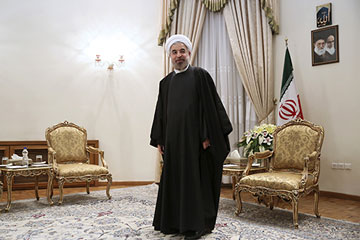
President Rouhani holds the key to Irans economic revival.
(5 of 6)
But Rouhani supporters fear their prospects, both at home and abroad, are more likely to be sabotaged by Washington in an election year than by hard-liners in Tehran. The temporary nuclear deal calls for Iran to halt sensitive parts of its program and allow daily U.N. inspections during six months of intense diplomacy. In exchange, Tehran won a pledge of no new sanctions and minor sanction relief worth about $7 billion. Even so, a bipartisan group of U.S. Senators is pressing for a new sanctions bill to cut off Iran's oil exports; it also calls for the U.S. to use military force and economic resources to stand with Israel if it should decide to attack Iran. The sanctions would not go into effect for six months, but at least 59 Senate co-sponsors contend that more pressure will only enhance diplomatic prospects. Zarif, the Foreign Minister, counters that it is instead a deal buster that demonstrates a "lack of seriousness" on the part of the U.S.: "My parliament can also adopt various legislation that can go into effect if negotiations fail. But if we start doing that, I don't think that we will get anywhere." Indeed, by mid-January more than one-third of the 290 members of Iran's parliament, or Majlis, countered with a bill requiring enrichment of uranium closer to the level needed to fuel a bomb. They too want to ratchet up the pressure.
White House officials express dismay that the best chance ever to de-escalate the nuclear standoff with Iran may be thwarted by legislation with sufficient support to be veto-proof. "For the sake of our national security and the peace and security of the world, now is the time to give diplomacy a chance to succeed," Obama said in a Jan. 12 statement. Both Presidents are warning that spoilers could be ready to push their nations over the precipice--this time potentially into the abyss of war.
Hanging on the Deal
On my last day in Tehran, I go to see Zahra Eshraghi, a women's-rights activist who is also revolutionary royalty. Her grandfather was Ayatullah Ruhollah Khomeini, the charismatic cleric who unified Iran's discordant opposition to end 2,500 years of dynastic rule. The Ayatullah's public approval of the embassy takeover was also what turned a brief protest into a 15-month international crisis. Eshraghi's family remains central to Iranian politics. Her husband is a former Deputy Speaker of parliament. Her brother-in-law is Khatami, Iran's first reform President.
It is telling that seven of Khomeini's 15 grandchildren are now outspoken reformers. Several supported the Green movement's mass protests challenging the disputed 2009 election. Eshraghi has volubly denounced discriminatory laws against women and the mandatory dress code. "The chador is not an obligation," she tells me. Her grandfather had called the enveloping black shroud "the flag of the revolution" and appealed to all women to wear it. Eshraghi is sufficiently rebellious that the hard-line Guardian Council, a powerful body of 12 conservative jurisprudents, disqualified her (and her incumbent husband) from running for parliament in 2004.
